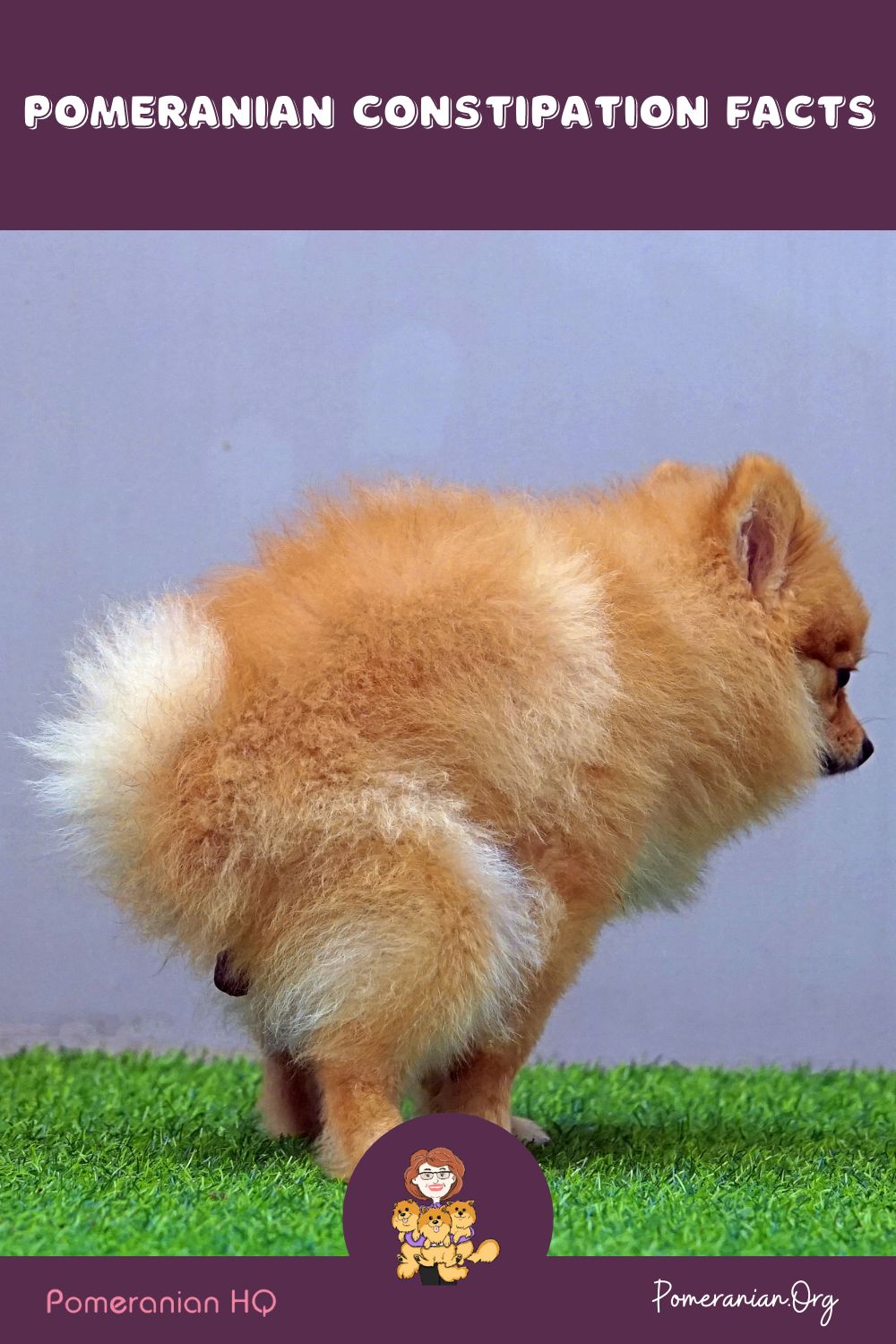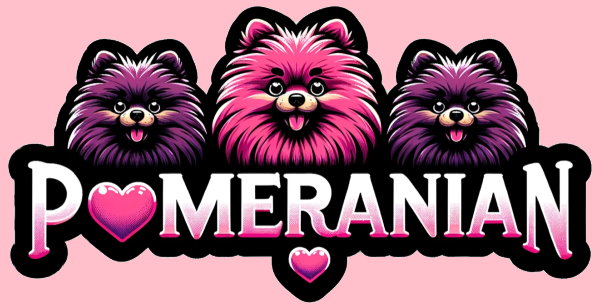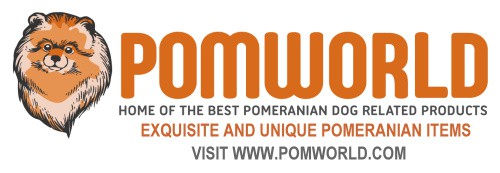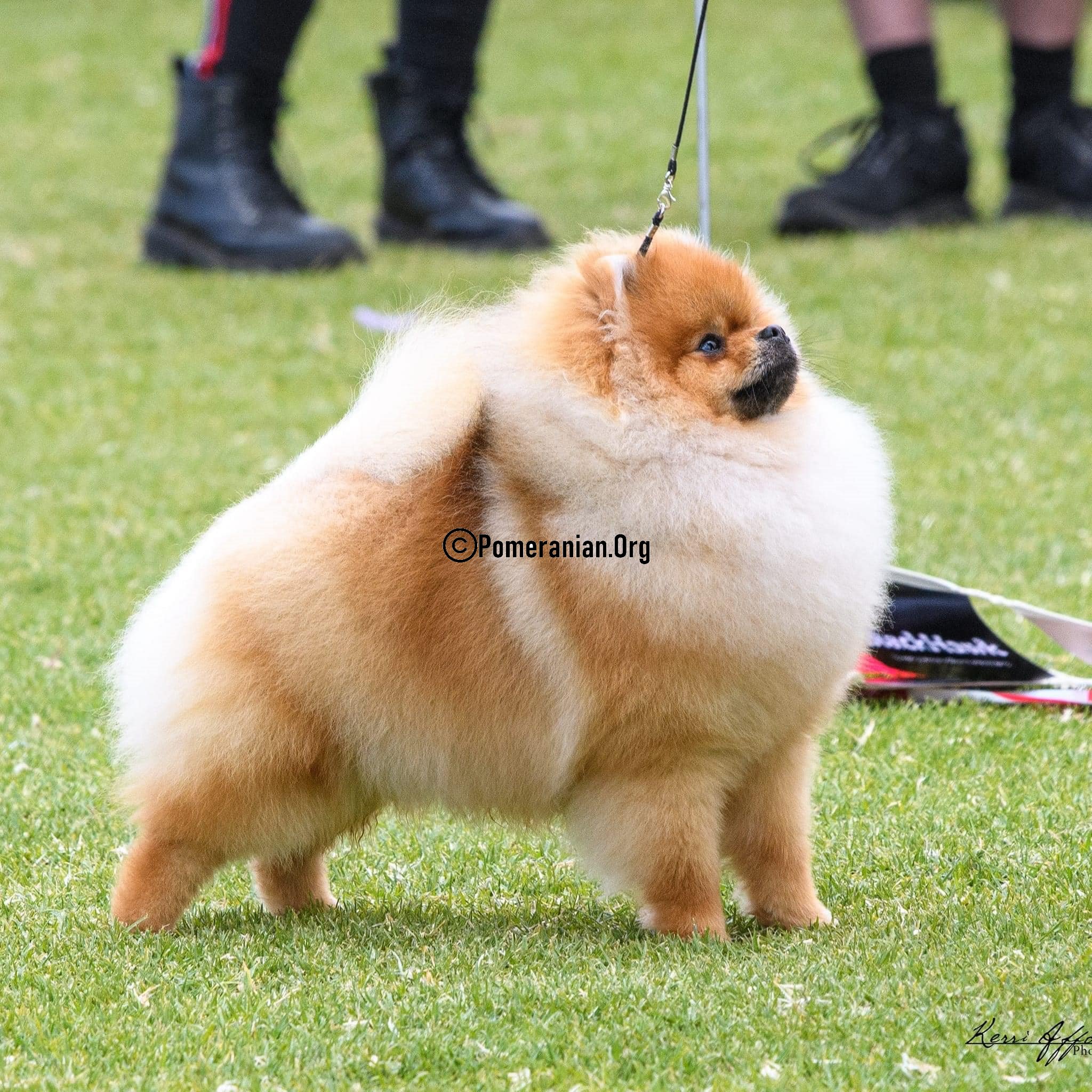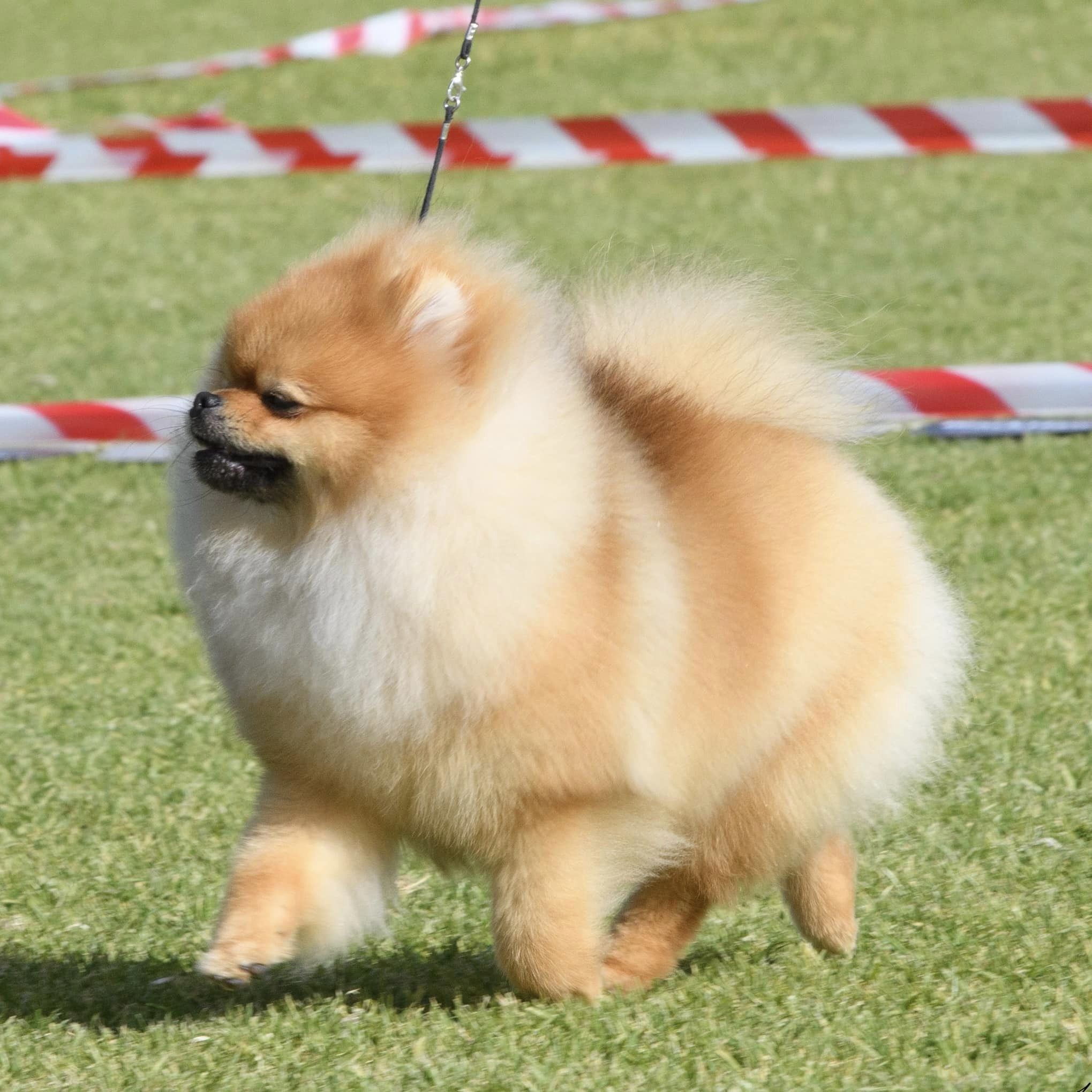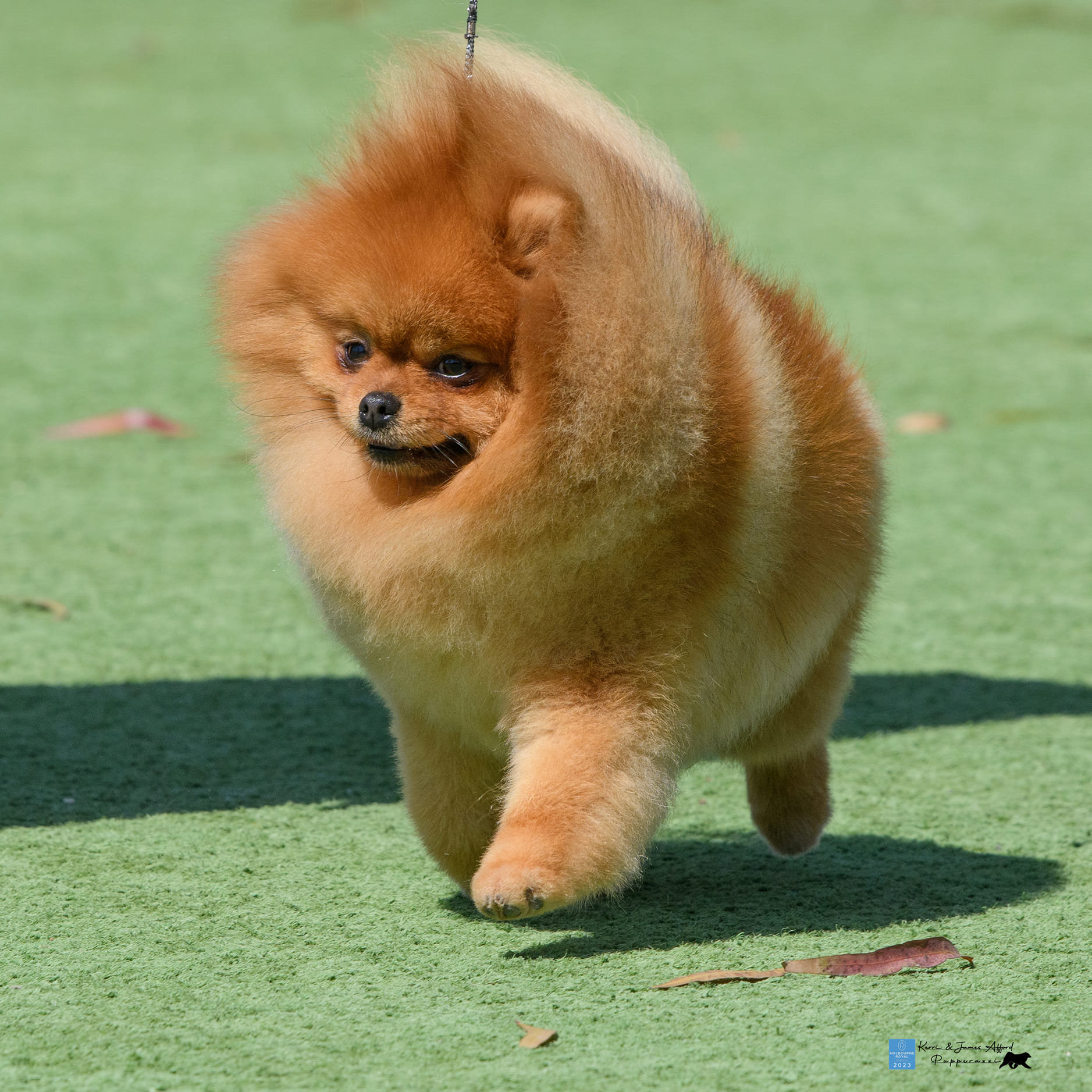Last Updated on 24/04/2024 by Dochlaggie. Post first published on April 7, 2023.
Do you have a beloved Pomeranian in your family and are now worried because they seem to be having difficulties with their digestion? Constipation is a common problem amongst dogs, particularly smaller breeds.
If left untreated, constipation can cause discomfort, pain, and potentially severe health conditions. Hence, it’s essential to understand how to recognize when your pet contains it and what treatment options are available.
In this blog post, we’ll look at why Pomeranians might suffer from constipation—including dietary factors such as dehydration or eating poor-quality food—and provide helpful information about prevention and treatments.
Read on for more advice on ensuring your furry companion remains healthy and happy!
What To Do If Your Pomeranian Puppy is Constipated
If your Pom is having a bowel movement, you may check it out and wonder if it’s normal or too hard. You may see your Pom having trouble, straining and struggling, to empty his bowels.
This article will help teach you what Pomeranian stool samples should and should NOT look like. The best foods to feed a dog to ensure healthy bowel movements and what to do if your Pomeranian dog has difficulty pooping. Natural puppy laxative solutions. As well as many teaching aspects of dog bowel movements.
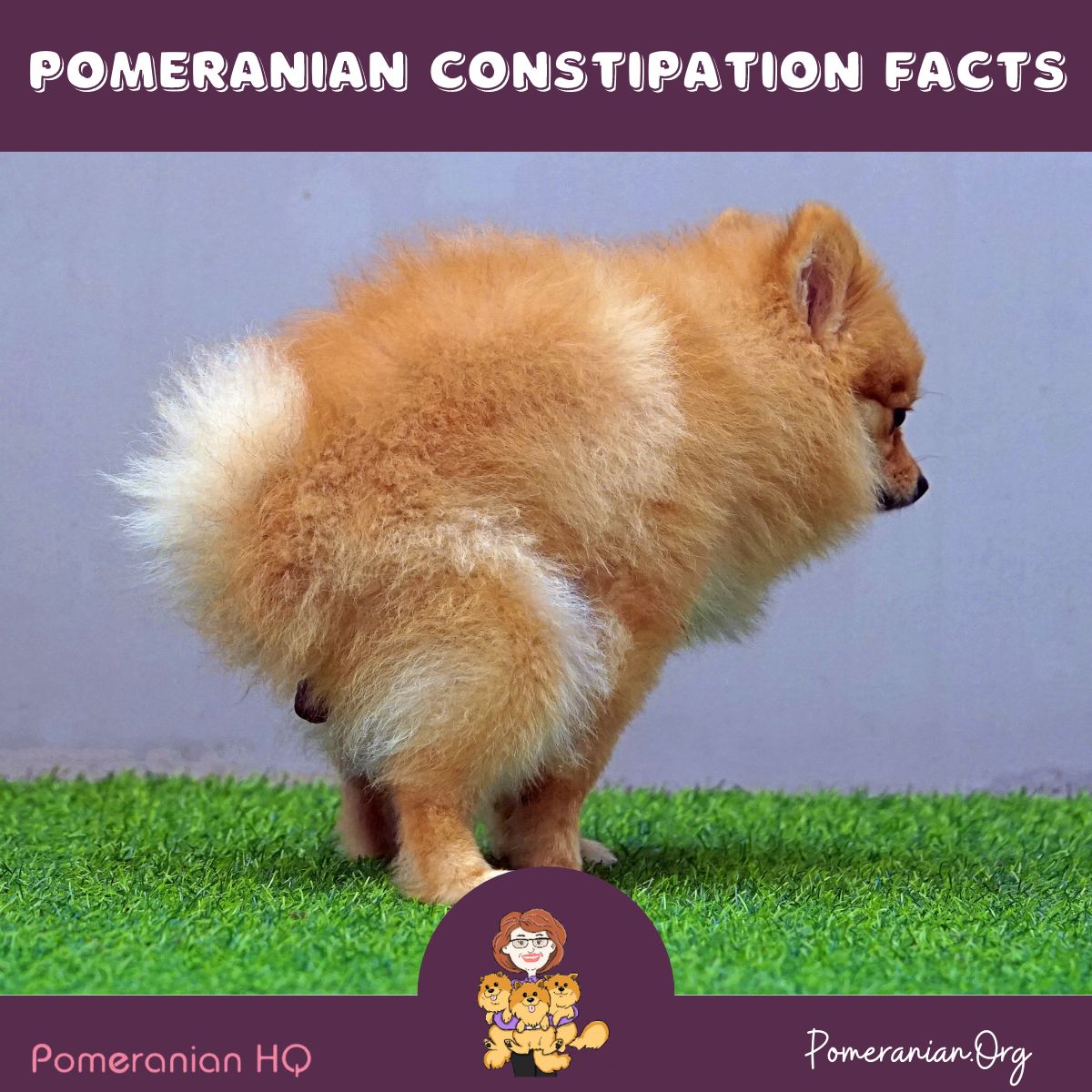
Constipated Pomeranian Puppy Signs
If your Pom suffers from constipation, he’ll have various difficulties with bowel movements, including:
- Lots of trouble just pushing out a small amount of feces.
- Small occasional movements.
- He makes no movements, even if he pushes as hard as possible.
Natural Laxative for Dogs
Define “Normal” Pomeranian Puppy Bowel Movement
Pomeranian Puppy Bowel Movement Frequency
A healthy Pomeranian will generally have 1 – 2 stools each day. More than that may indicate diarrhea or problems with loose stools. If he only has a single stool every second day, he likely has constipation.
Pomeranian Puppy Bowel Movement Consistency
Normal dog feces should have a dough-like consistency. If you’re taking him for a walk and he stops to drop a stool, you would pick it up in a bag, and it would be in one piece, although a little soft. If it comes out in a small pile of rocks or one hard piece, that’s constipation.
Puppy Bowel Movement Shape
A dog’s normal poop shape will generally be like a log. However, it may come out in a spiral form, like a typical soft-serve ice cream. Then it ends up as a small mound in a corkscrew form. If it still has a dough-like consistency, you can regard it as normal. With dog constipation, it’s often released like tiny shotgun pellets.
Pomeranian Puppy Poop Color
- Normal Puppy Poop Color. The color of your Pomeranian’s poop is not directly linked to constipation, but it can still teach you things. If he has no problems, his stool will be medium brown chocolate. If he’s eating manufactured foods with lots of artificial coloring, those green, blue, or red colors may appear in his stool. If you’re giving him a large amount of coloring in his food, that can also affect the stool’s color.
- Bright red color. This can mean he’s bleeding inside because he’s so badly constipated that his internal tissues get torn while he struggles to push out the stool. It may indicate he has a different medical complaint needing further investigation.
- Black puppy poop. If your Pomeranian’s stool is a “tarry black” color, this can mean he’s bleeding inside. He may have an issue with his gastrointestinal tract because that creates this slick black color. You need to talk to your vet urgently if this color appears.
- Very light tan. This color could mean he has liver problems, so a trip to the vet is necessary so he can be checked out properly.
Reasons for Pomeranian Constipation
There are five main reasons for your Pomeranian to have dog constipation:
- Dehydration is the most common cause. Your dog’s stools are 75% water. If he doesn’t drink enough water, there won’t be sufficient fluids to get into his intestines and soften his poop so it can be expelled without strain.
- Your Pom may ingest a foreign body. This list can include grass, coins, small pebbles, and much more.
- Side effects of medications. Is your pet on any medications? Many drugs can cause constipation, such as antihistamines prescribed for allergies and iron supplements to improve deficiencies.
- Habit. If your Pomeranian is left alone at home for lengthy periods and is forced to control his urge to visit the bathroom, he may get used to doing this automatically. If he’s on a long car ride, on a plane, or in a boarding kennel, he may feel uneasy and stop himself from pooping.
- If you feed your senior dog only dry food, that can quickly cause constipation.
Pomeranian Dog Constipation Signs
If your Pomeranian is constipated, he’ll have infrequent movements of his bowels or have to strain hard.
Pomeranian Constipation Prevention
Here are numerous actions you can take to protect your Pomeranian from becoming constipated:
1. Ensure your Pomeranian Drinks Sufficient Water
Some dogs are fussy when drinking water and refuse to drink warm, stale, or dirty water. So, you need to ensure your Pom has plenty of fresh water, and it’s replaced at least twice a day, depending on the weather and how much is consumed. It’s best to use filtered water because it won’t have any nasties in it. Use two or more bowls placed at strategic places around your home.
Have plenty of spare bowls so you can replace a bowl of warm water with a clean bowl of filtered water and toss the replaced bowl in the sink for cleaning later if you can’t do it immediately. Particles from food can easily transfer to water, so this should be avoided if possible.
Never use cheap plastic bowls for water or food. Ceramic and stainless steel are the two best choices. The coloring in plastic bowls can leak and get stuck to your pet’s coat and face. Ask your vet or talk to a shop owner specializing in Pomeranian products.
During hot weather, your Pomeranian will drink a lot more water, so you have to be vigilant in replacing his water more frequently. If he’s very active, he’ll need more water on those days too. So keeping your Pomeranian properly hydrated is critical to caring for your pet and ensuring he doesn’t get constipated.
2. Puppy Proofing Your Home
Whether your Pom is a puppy or an adult, you must still puppy-proof your home because dogs are naturally curious. He may swallow things such as hair pins, coins, buttons, and other foreign bodies if he discovers them.
Remember, your dog sees things from an entirely different angle than you, so it pays to move around on your belly and look under everything, so you can see and retrieve items that may have been kicked under your table, chair, couch, or bed.
3. Pomeranian Puppy Eating Grass?
Is it ok for puppies to eat grass ? Don’t allow your Pomeranian to consume grass because it’s not food; it’s a foreign substance.
Watch Puppy when he’s outside and stop him if he tries to eat grass. He may also ingest pebbles which can block create a blockage and constipation as a result.
Most lawns will absorb polluted rainwater, stinging insects, and lawn chemicals. Dogs eat grass mainly because they’re not getting enough nutrients, so feed them healthy greens instead.
4. Feed the Best Pomeranian Food
Plenty of information about the ideal commercial and home-cooked foods to feed your Pomeranian is available. There are also healthy manufactured snacks available for him. For example, small baby carrots are a food they enjoy. Green peas and beans can be mixed in with their regular food.
5. Medication
If your Pomeranian has been prescribed medication for allergies and has constipation, talk to your vet. If your Pomeranian is badly constipated, changing his medication dose or type may help, or a constipation reliever may be needed.
6. Pomeranian Home Alone?
If your Pom dog spends most of the time at home alone, ensure you have organized a comfortable, happy environment. Home-alone anxiety may prevent the puppy from moving his bowels when needed, and Puppy may try to “hold on” until you arrive home.
Don’t make his space too confined, or he’ll try not to poop. Never keep him locked in a crate all day. They should only be used for transport. Instead, get a canine playpen or canine gates.
Ensure there is room for his bed, space to play with toys, and a corner he can use for a bathroom. Even if he doesn’t do his business in the right spot, it’s ok, as your chief aim is to teach him how to do it outside. Lay a few pee pads in his space in case his aim isn’t true.
You want him to feel comfortable having bowel movements in his pen, which will help avoid episodes of constipation.
7. Senior Pomeranian Dogs
If your senior Pomeranian is fed only kibble, he may become constipated. However, you can soak the kibble in water for 20 minutes before giving it to your pet. If you do home cooking, ensure plenty of moisture in the food.
8. Long Distance Traveling
If your dog becomes constipated during long car trips, pull over every two hours. Keep him on his leash but let him stretch, eat a snack, drink water, and then go to the bathroom.
What Can You Give a Dog for Constipation?
Has your pup been having some trouble going to the bathroom? Constipation can signify more serious ailments, so it’s best to talk with your vet first.
While you wait for their appointment, simple lifestyle adjustments and home remedies could lend a helping paw!
Home Constipation Remedies for Dogs
Adding these items to your dog’s diet can relieve constipation for dogs with minor constipation.
Pumpkin for Dog Constipation
Feeding your pup pumpkin puree isn’t just a fun treat – it’s also incredibly nutritious! This high-fiber, moisture-rich superfood will help keep their digestive tract running smoothly.
And while you shouldn’t give them the pie filling, serving up plain pumpkin straight from the can will surely make tails wag with delight.
Canned Dog Food for Dog Constipation
The softer canned dog food and higher moisture content will help regulate their digestive system and create softer stool. You should mix canned food with their regular food to avoid an upset stomach.
Dietary Fibre
Canine dietary fiber supplements will increase fiber in their tiny bodies. Fiber supplements will regulate their bowel movements and help soften their stool.
Contact your veterinarian for the correct supplements for your dog.
Milk for Dog Constipation
Many Pomeranians will respond well to drinking milk. Too much milk can cause diarrhea if your dog does not have constipation. But if you add a quarter of a cup of milk to your constipated pet’s food or in an empty bowl to drink (if he enjoys the taste), it can ease constipation. Don’t give him more than that, or his stomach can feel queasy.
Fresh Water
Ensuring your dog is well-hydrated with access to clean water is essential for their overall health and well-being. Please encourage them to stay hydrated by providing plenty of fresh H2O. Ensure your dog is drinking the appropriate amount for his size daily.
Exercise
Get your pup moving with a healthy dose of physical activity! Going on lengthy strolls can keep bowels regulated, while dog-friendly exercises like running, fetch, or chase are sure to stimulate digestive wellness. Regular exercise doesn’t have to be boring – get creative and make it fun for you both!
Laxatives?
If the problem persists, a vet is the best option. He may prescribe a laxative. NEVER give a dog a human laxative because it can kill him. The vet will prescribe a laxative containing lactulose, a safe and extremely effective substance for your pet.
If you think your Pomeranian has a blockage that prevents him from pooping, get him to the emergency vet hospital urgently.
Pomeranian Constipation Conclusion
In conclusion, if you think your Pomeranian may be constipated, speak to your vet immediately. While there are steps, you can take at home, such as increasing their roughage intake and hydration levels, professional medical advice is best.
With the help of your vet, you will be able to determine the best course of action to ensure that your Pomeranian gets the help they need. While the signs and causes of constipation in dogs differ, there are many things that an experienced vet can do to help relieve their discomfort and get them back on their feet again.
Knowing the signs of a constipated dog and what steps to take could make all the difference for your beloved pet. So remember: if you doubt your pup’s health or bladder issues, go to a qualified veterinarian for diagnosis and treatment.
Please note: while I do discuss health, care, and behavioral issues, you should never use this information as a replacement for advice from qualified veterinarians, diagnoses, or recommended treatment regimes. If you have any worries about the health of your Pomeranian, your first contact should be your regular vet or, if you don’t yet have one, a vet that works locally. Never ignore or avoid treatment and advice from your vet because of a piece of information you have read on any website.
Copyright Pomeranian.Org. All Rights Reserved.
References and Further Reading:
[1] Denise Leo “The Pomeranian Handbook.”
